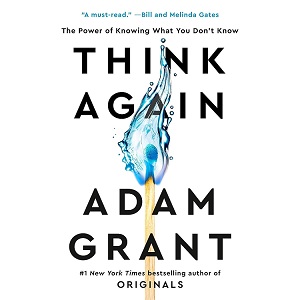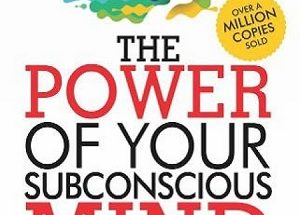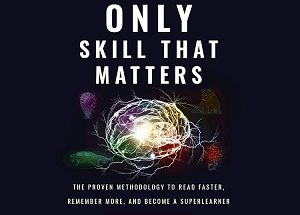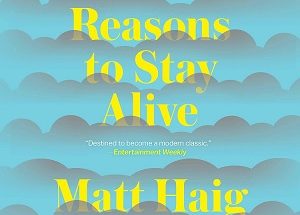Think Again: The Power of Knowing What You Don’t Know by Adam Grant is a thought-provoking book that challenges readers to rethink their beliefs, embrace uncertainty, and cultivate a mindset that values curiosity and adaptability. Grant, an organizational psychologist, explores the importance of rethinking not just in professional environments but also in personal life, highlighting the power of open-mindedness and the willingness to change one’s mind. Below are 31 lessons from the book:

Read: Get Out of Your Head
1. Embrace the Joy of Being Wrong
One of the core lessons in Think Again is the value of embracing the joy of being wrong. Grant argues that being wrong should not be seen as a failure but as an opportunity for learning and growth. By acknowledging when we are wrong, we open ourselves up to new possibilities and ideas.
- Actionable Insight: Cultivate a mindset that sees mistakes as learning opportunities rather than failures. When you realize you’re wrong, take the time to understand why and what you can learn from the experience. This approach not only helps you grow but also encourages a culture of learning and innovation in your environment.
2. The Power of Rethinking
Grant emphasizes the importance of rethinking—revisiting and questioning your existing beliefs and assumptions. He explains that in a fast-changing world, the ability to rethink and adapt is more valuable than ever. This involves being open to new information, even when it contradicts what you previously believed.
- Actionable Insight: Make it a habit to regularly question your assumptions and beliefs. Engage in discussions with people who have different perspectives, and be willing to adjust your views based on new evidence or insights. This practice can help you stay flexible and adaptable in the face of change.
3. Challenge Your Mental Models
Mental models are the frameworks we use to understand the world around us. Grant argues that these models can become outdated or limiting if we don’t regularly challenge and update them. He encourages readers to critically examine their mental models and be open to revising them.
- Actionable Insight: Reflect on the mental models you use to navigate your personal and professional life. Identify areas where these models may no longer serve you and seek out new information or perspectives that can help you update them. This will enable you to approach problems and opportunities with a fresh, more effective mindset.
4. The Benefits of a Scientist Mindset
Grant advocates for adopting a “scientist mindset,” where we approach our beliefs as hypotheses to be tested rather than as truths to be defended. This mindset encourages curiosity, experimentation, and a willingness to change our views based on evidence.
- Actionable Insight: Approach your beliefs and opinions with a scientist mindset. Instead of trying to prove you’re right, focus on testing your ideas and being open to revising them based on new data. This mindset can lead to more innovative thinking and better decision-making.
5. The Importance of Listening Over Speaking
In Think Again, Grant emphasizes the importance of listening over speaking. He argues that listening is not just about hearing others but about truly understanding their perspectives. This deep listening allows us to learn from others and reconsider our own views.
- Actionable Insight: Practice active listening in your conversations. Focus on understanding the other person’s perspective without immediately jumping to respond or defend your own views. This approach can lead to more meaningful discussions and deeper learning.
6. The Dangers of Overconfidence
Overconfidence can be a significant barrier to rethinking. Grant warns that when we are too confident in our beliefs, we become closed off to new information and resistant to change. He encourages readers to stay humble and curious, even when they feel certain about something.
- Actionable Insight: Recognize when overconfidence might be influencing your decisions or beliefs. Make a conscious effort to seek out opposing viewpoints and consider the possibility that you might be wrong. This will help you avoid the pitfalls of overconfidence and make more informed choices.
7. The Value of Constructive Conflict
Grant explores the value of constructive conflict—disagreements that are focused on finding the best solution rather than proving who is right. He argues that when approached with a mindset of curiosity and respect, conflict can be a powerful tool for learning and innovation.
- Actionable Insight: Encourage constructive conflict in your team or organization by fostering an environment where different perspectives are valued and debated respectfully. Focus on finding the best solutions rather than on winning arguments. This approach can lead to better outcomes and more innovative ideas.
8. Reframing Failure as a Learning Opportunity
In Think Again, Grant discusses the importance of reframing failure as a learning opportunity. He argues that failure is an inevitable part of growth and that by viewing it as a chance to learn, we can overcome the fear of failure and become more resilient.
- Actionable Insight: When you encounter a failure or setback, take the time to reflect on what went wrong and what you can learn from the experience. This mindset will help you bounce back more quickly and avoid making the same mistakes in the future.
9. The Role of Community in Rethinking
Grant emphasizes the role of community in fostering a culture of rethinking. He argues that surrounding yourself with people who challenge your views and encourage you to rethink can significantly enhance your ability to adapt and grow.
- Actionable Insight: Build a community of individuals who value learning and growth. Engage in regular discussions with these individuals and be open to their feedback and challenges. This community can serve as a support system for your rethinking journey.
10. The Power of Cognitive Flexibility
Cognitive flexibility—the ability to switch between different ways of thinking and adapt to new situations—is a key skill in rethinking. Grant discusses how developing this skill can help us navigate uncertainty and complexity more effectively.
- Actionable Insight: Practice cognitive flexibility by exposing yourself to new experiences, ideas, and perspectives. Challenge yourself to think differently and to adapt your thinking based on the situation at hand. This will help you become more adaptable and innovative in your approach to problem-solving.
11. The Importance of Unlearning
Grant argues that unlearning—letting go of outdated or harmful beliefs and behaviors—is just as important as learning new things. Unlearning allows us to clear out mental clutter and make room for more accurate and useful knowledge.
- Actionable Insight: Identify beliefs or habits that may no longer serve you and consciously work on letting them go. This process may involve challenging deeply held assumptions or behaviors, but it is crucial for personal and professional growth.
12. Embracing a Growth Mindset
Building on the work of Carol Dweck, Grant emphasizes the importance of a growth mindset—the belief that abilities and intelligence can be developed through effort and learning. This mindset encourages us to see challenges as opportunities for growth rather than as threats.
- Actionable Insight: Cultivate a growth mindset by viewing challenges as opportunities to learn and grow. When faced with difficulties, focus on what you can learn from the experience and how you can improve, rather than on the possibility of failure.
13. The Role of Curiosity in Rethinking
Curiosity is a driving force behind rethinking. Grant highlights the importance of maintaining a curious mindset, where you are constantly seeking new information and questioning your assumptions.
- Actionable Insight: Nurture your curiosity by exploring new topics, asking questions, and seeking out diverse perspectives. Curiosity can lead to new insights and innovations that you might not have discovered otherwise.
14. The Ethics of Rethinking
Grant touches on the ethical implications of rethinking. He argues that being willing to change our minds based on new evidence is not just a personal virtue but a social responsibility. In a world where misinformation is rampant, the ability to rethink and adapt is crucial for making ethical decisions and contributing to the greater good.
- Actionable Insight: Approach rethinking with an ethical mindset. Consider the broader implications of your beliefs and decisions, and be willing to change them if they are no longer aligned with your values or the greater good.
15. The Importance of Intellectual Humility
Grant emphasizes the value of intellectual humility—the recognition that our knowledge is limited and that we might be wrong. This humility allows us to be open to new information and perspectives, fostering a culture of continuous learning and growth.
- Actionable Insight: Cultivate intellectual humility by regularly questioning your assumptions and beliefs. Engage in discussions with people who hold different views and be open to changing your mind when presented with new evidence.
16. The Rethinking Cycle
Grant introduces the concept of the “rethinking cycle,” which involves recognizing the need to rethink, embracing the discomfort of uncertainty, and continually revising our beliefs as we acquire new information. This cycle is essential for personal and professional growth.
- Actionable Insight: Practice the rethinking cycle by regularly reviewing your goals, strategies, and beliefs. Set aside time to reflect on what’s working and what’s not, and be willing to make changes based on new insights.
17. The Dangers of “Preacher, Prosecutor, and Politician” Modes
Grant describes three common mental modes—preacher, prosecutor, and politician—that hinder our ability to rethink. In preacher mode, we defend our beliefs; in prosecutor mode, we attack others’ views; and in politician mode, we seek approval from others. These modes prevent us from being open to new ideas.
- Actionable Insight: Recognize when you’re slipping into these modes and shift to a more open-minded, exploratory mindset. Focus on learning and understanding rather than convincing others or defending your views.
18. The Value of Scientific Thinking
Grant advocates for adopting a scientific mindset, where beliefs are treated as hypotheses that can be tested, revised, or discarded based on evidence. This approach encourages curiosity, experimentation, and adaptability.
- Actionable Insight: Approach problems and decisions with a scientific mindset. Test your assumptions, seek out evidence, and be willing to revise your conclusions based on what you learn.
19. The Power of “Confident Humility”
Grant introduces the concept of “confident humility,” which combines the confidence to pursue goals with the humility to recognize that we don’t have all the answers. This balance allows us to be ambitious while remaining open to new ideas and feedback.
- Actionable Insight: Strive to balance confidence with humility in your personal and professional life. Be bold in pursuing your goals, but remain open to feedback and willing to adjust your approach as needed.
20. Rethinking in Relationships
Grant emphasizes the importance of rethinking in relationships, whether personal or professional. He argues that being open to revising our views about others and how we interact with them can lead to healthier, more productive relationships.
- Actionable Insight: Regularly reassess your relationships and interactions with others. Be willing to change your approach if it’s not working and seek to understand others’ perspectives more deeply.
21. The Role of Psychological Safety in Rethinking
Creating an environment of psychological safety—where people feel comfortable expressing their thoughts and admitting mistakes without fear of judgment—is crucial for encouraging rethinking in teams and organizations.
- Actionable Insight: Foster psychological safety in your workplace or social groups by encouraging open dialogue, valuing diverse opinions, and responding to mistakes with curiosity rather than criticism.
22. Teaching Kids to Rethink
Grant highlights the importance of teaching children to think critically, question assumptions, and be open to changing their minds. This skill set is essential for navigating an increasingly complex and rapidly changing world.
- Actionable Insight: Encourage children to ask questions, explore different viewpoints, and think critically about the information they encounter. Model rethinking behavior by showing them how you reassess your own beliefs.
23. Rethinking Your Career
Grant discusses how rethinking can be particularly valuable in career planning. Rather than sticking rigidly to a predefined career path, he suggests regularly reassessing your goals and exploring new opportunities that align with your evolving interests and skills.
- Actionable Insight: Periodically review your career goals and be open to exploring new directions. Consider how your interests and skills have changed over time and whether your current path still aligns with your long-term aspirations.
24. The Benefits of “Challenger Networks”
Grant encourages the creation of “challenger networks”—groups of people who are willing to question your ideas and push you to think differently. These networks are invaluable for personal and professional growth, as they help you avoid echo chambers and broaden your perspective.
- Actionable Insight: Build a network of trusted individuals who are not afraid to challenge your thinking. Seek out diverse opinions and encourage constructive criticism to help you refine your ideas and approaches.
25. The “Argument Dilution Effect”
Grant introduces the concept of the “argument dilution effect,” where presenting too many weak arguments can dilute the strength of your overall case. He advises focusing on your strongest points and avoiding the temptation to overwhelm others with information.
- Actionable Insight: When making a case or argument, prioritize your strongest points and present them clearly and concisely. Avoid overloading your audience with unnecessary details that could weaken your overall message.
26. Rethinking in Leadership
Grant discusses how effective leaders are those who encourage rethinking within their teams and organizations. Rather than clinging to outdated strategies or beliefs, successful leaders are open to new ideas and foster a culture of innovation.
- Actionable Insight: As a leader, create a culture that values rethinking and innovation. Encourage your team to question assumptions, experiment with new ideas, and continuously seek improvement.
27. The Power of “Active Open-Mindedness”
Active open-mindedness involves actively seeking out information that challenges your beliefs and being willing to revise your views in light of new evidence. Grant argues that this mindset is essential for personal growth and societal progress.
- Actionable Insight: Practice active open-mindedness by regularly exposing yourself to diverse perspectives and challenging your own beliefs. Engage with people who hold different views and be willing to consider new evidence.
28. The Danger of “Binary Bias”
Grant warns against “binary bias,” the tendency to see things in black and white, either/or terms. This oversimplification can prevent us from appreciating the complexity of issues and finding more nuanced solutions.
- Actionable Insight: Challenge binary thinking by exploring the gray areas and complexities of issues. Avoid falling into the trap of oversimplifying problems and be open to multiple perspectives and solutions.
29. Overcoming Confirmation Bias
Grant discusses the challenge of overcoming confirmation bias—the tendency to seek out information that confirms our existing beliefs and ignore evidence that contradicts them. Recognizing and counteracting this bias is crucial for effective rethinking.
- Actionable Insight: Actively seek out information and perspectives that challenge your beliefs. When researching or making decisions, make a conscious effort to consider opposing viewpoints and evidence.
30. The Role of Feedback in Rethinking
Grant emphasizes the importance of feedback in the rethinking process. Constructive feedback helps us identify blind spots, refine our thinking, and improve our performance.
- Actionable Insight: Seek regular feedback from others, especially those who offer constructive criticism. Use feedback as an opportunity to reflect on your strengths and areas for improvement.
31. The Long-Term Benefits of Rethinking
Finally, Grant highlights the long-term benefits of cultivating a rethinking mindset. By continuously challenging our beliefs and adapting to new information, we can achieve greater success, build stronger relationships, and lead more fulfilling lives.
- Actionable Insight: Make rethinking a lifelong habit. Regularly assess your beliefs, strategies, and goals, and be open to making changes that align with your evolving understanding and circumstances.
Conclusion
Think Again: The Power of Knowing What You Don’t Know by Adam Grant offers a compelling case for the importance of rethinking in our personal and professional lives. The lessons from the book encourage us to embrace uncertainty, challenge our assumptions, and remain open to new ideas and perspectives. By adopting the practices of rethinking, we can become more adaptable, innovative, and effective in navigating the complexities of the modern world.


